The Bears on Wednesday gave fans and all of Chicago a first look at what they're planning to build along the city's lakefront, announcing everything from a location to roofing plans to green space to plaza details.
The team revealed plans for more than just a stadium, rather showcasing an entertainment hub that can host Super Bowls, playoffs, concerts and more.
"We have the best museums in the country. We have the most beautiful lakefront. We have the most vivid downtown architectural design. And this affords us the opportunity to be able to bring this all together in the greatest city on the planet," Bears President and CEO Kevin Warren said during a press conference live Wednesday.
"We want to build a recreational and cultural campus to enhance upon the things that we have here in place. We view young students being able to study here in the park, [to] take the classrooms out of the classroom, out of the museums, and bring it into the open area and take it back into the museums and back into the classrooms," he said, adding that there's an "opportunity to bid for the Super Bowl, for the Final Four, for college football playoffs, Big Ten championship games, concerts."
Get a weekly recap of the latest San Francisco Bay Area housing news. Sign up for NBC Bay Area’s Housing Deconstructed newsletter.
"This really becomes an international destination [for] the Olympics, World Cup," Warren said.
The proposal offers the first chance for fans and the city to view what the team has planned since shifting gears away from the Arlington Heights property they previously purchased.
The Bears bought 326 acres of land in Arlington Heights last year, and previously announced plans to build a new stadium there. But contentious negotiations about property taxes in the suburbs have become an obstacle for that plan. Earlier this year the team said it was switching its focus away from Arlington Heights back to the city.
NFL
"They're our team," Chicago Mayor Brandon Johnson said as he touted the team's decision to return their sights to the city.
Renderings of the proposed new stadium include a "fixed" roof, with the stadium situated atop the current South Parking lot of Soldier Field. As for Soldier Field, the columns exist, but the stadium is gone. (See the full renderings here)
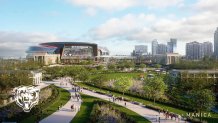
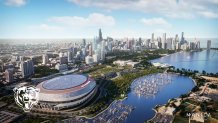
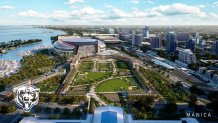
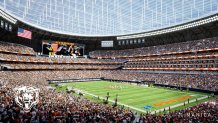
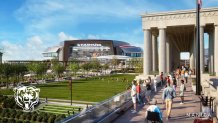
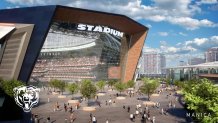
Among the new features highlighted by the team were:
- Expanded green and open space
- Added playfields, creating more safe places for youth and families to gather
- Public restrooms along with food and beverage options to enhance park user experience
- Better infrastructure that improves access to Museum Campus
- A year-round venue that can host community events of all sizes
One of the biggest question from residents involved financing for the new plan. Johnson addressed those concerns Wednesday.
“I’m going to repeat that one more time to make sure that everybody gets it,” Johnson said during the announcement. “This project will result in no new taxes on the residents of Chicago.”
The Bears have previously committed to contributing $2 billion to the construction of a new stadium in Chicago, but the project is expected to cost significantly more money, with estimates of a total of $4.7 billion between the stadium and infrastructure needs. The team said their investment will cover 70% of the project's funding needs.
The move has faced some criticism from preservation group Friends of the Parks, which successfully sued to prevent George Lucas from building a museum along the lakefront and has previously voiced opposition to the construction of any new stadium project on Museum Campus.
Friends of the Parks declined comment ahead of the Bears' announced press conference.
The Bears' plans have also faced increased scrutiny amid a separate push from the Chicago White Sox to secure public funding for a stadium project in the South Loop. According to a recent Crain's report, the teams have been told that there is little appetite on the part of lawmakers to approve separate financing plans for stadiums, and urged the two teams to work together.
Warren and the Bears have said they are still happy to own the Arlington Park property, and officials there remain optimistic that the team could return to the negotiating table.
"We are the largest landowner in Arlington Heights right now. 326 acres," Warren said. "We own a beautiful piece of land. And I have great respect for Mayor Hayes and Randy Recklaus and all of the politicians there. My belief right now, these projects are incredibly difficult. And just learning the various things that I did in Minnesota, you have to be laser-focused. And right now, we're putting our energy to downtown Chicago, to the museum campus, just from an energy and resource standpoint. So we still own the land. We’re the largest landowner. We’ll stay in communication with Arlington Heights, but the focus now has to be on Chicago to give us the best opportunity for success."
Arlington Heights officials said they will be ready and waiting for if the Bears change their minds.
"There’s a lot of challenges ahead with respect to the lakefront stadium in terms of financing and opposition by interest groups like Friends of the Parks… We stand ready to continue discussions with the Bears if they do get a no on the lakefront," Mayor Tom Hayes told NBC Chicago.
He added that while the village is respectful of the Bears' plan to explore a lakefront stadium, they believe the Arlington Heights property is a better fit.
“Other than a lake which we don’t have in Arlington heights, I think everything else in Arlington heights is a better solution for them," he said.



